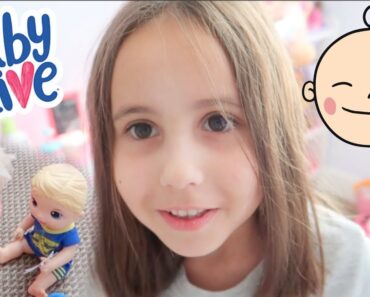Age-appropriate naps during the daytime are essential for a baby to get the required hours of sleep since they won’t sleep for longer stretches at nighttime. Babies require fewer naps as they grow older, but it is essential to supplement their nighttime sleep with naps for optimal development.
Although it can be challenging to establish a nap schedule for a baby who won’t nap, the benefits of napping are worth the effort. Read this post to know more about nap schedules, reasons why some babies don’t nap, and tips to help a baby nap with minimal fuss.
How Many Naps Does A Baby Need?
The number of naps and their duration may vary depending on the baby’s age. The following table provides the number of naps based on the infant’s age1.
| Age | Number of naps |
|---|---|
| 0 – 5 months | 1 – 5 naps per day |
| 6 – 11 months | 1 – 4 naps per day |
| 12 – 35 months | 0 – 2 naps per day |
Source: Sleep program by Queensland Government
A newborn may have a short sleep duration, with each sleep session lasting 50-60minutes since they feed more frequently than older babies. When babies reach three months of age, they tend to sleep longer at night and take fewer naps during the day. The number of daily naps decreases as your baby grows (2).
By four months, each nap may last 30 minutes to two hours. A six-month-old may nap up to a total of six hours a day. The duration of each nap and total naptime could vary among babies of the same age (3). Once your baby turns a toddler at the age of one year, their total nap duration may reduce to up to 4.5 hours a day. At two years, the total naptime may reduce to up to three hours a day.
Reasons Why Babies Won’t Nap
Babies may refuse to nap for various reasons ranging from simple ambient disturbances to physical discomfort or anxiety. The following are the various reasons why a baby may not nap (4).
- Not tired enough: Tired babies tend to fall asleep easily. Stimulating activities before naptime and excess nighttime sleep may prevent babies from feeling tired, making it difficult for them to nap.
- Too tired: Overtired babies may often be hyperactive and cranky, making it difficult for a parent to soothe them to sleep. Regular bedtime and naptime routines could prevent overtiredness in infants.
- Disturbances in the room: Noises, bright lights, the presence of others in the room, and other distractions could prevent the infant from falling asleep during naptime.
- Hunger: Hungry babies may cry for food and may not fall asleep. In such cases, they may take a nap immediately after feeding.
- Wet or soiled diapers: Babies can be irritated with wet or soiled diapers and often refuse to nap unless the diapers are changed.
- Teething and other issues: Babies may refuse to nap due to teething pain and other physical discomforts. They may appear sick, fussy, and may not be able to soothe themselves to nap.
- Sleep associations: Babies who are used to napping in a baby seat, swing, or stroller may get used to it, making it difficult for them to nap anywhere else. The absence of pre-naptime routines, such as rocking, may also interfere with naps if the baby is used to them. You may gradually change these sleep associations to make them fall asleep in their crib.
- Separation anxiety: Some babies may develop sleep problems due to separation anxiety, especially around six months of age. Fear of being away from parents may cause them to wake up with the inability to fall asleep again.
- Sleep regressions: Babies can revert to an erratic sleep pattern once in a while due to sleep regressions. These are normal and temporary and even occur in sleep-trained babies. The excitement of achieving new milestones and growth spurt could lead to sleep regressions in babies.
Tips To Help Babies Nap
Most babies refuse to nap for simple reasons, and careful observation can help the caregiver or parent identify and resolve the cause. The following tips may help babies have adequate naps for a sufficient duration per day (5).
- Follow a nap routine: Although you may feel the daytime nap is random, it is not. Establishing a routine can help the baby to nap easily. You may incorporate play, meal, diaper changes, and naptime to make the baby understand that it is time to nap after feeding or changing diapers.
- Nap in the crib: It is better to have a constant place for napping. Baby crib is the safest place and often lets the parent or caregiver rest at the same time. Do not place the baby in a stroller or your arms for naps since they may get used to it and later refuse to nap in the crib.
- Look for sleep cues: Observe your baby’s sleep cues, such as rubbing eyes, yawning, and fussing, and place them in the crib right away. Ignoring baby sleep cues may make you miss the sleep-readiness window, causing the baby to become overtired and difficult to soothe for naps.
- Meet basic needs: Babies love to take a nap when they are comfortable. You may ensure that they feel dry, warm, and fed before nap time.
- Playtime between naps: Allowing tummy time and playtime can help tire your baby, ensuring a solid nap. You may incorporate a daily play and activity routine for your little one.
- Manage physical discomfort and separation anxiety: Babies who won’t nap due to an illness or teething may need pediatric help. Pay extra attention to separation anxiety cues and alleviate them before they interfere with the baby’s naps.
Sleep regressions may last for some time and disappear. You may teach your baby to self-soothe and take a nap whenever your baby naps so that you can meet your baby’s needs without exhausting yourself. Babies who won’t nap due to ambient disturbances or physical discomfort may sleep once the issue is resolved.
Does Sleep Training Work For Babies Who Won’t Nap?
Nighttime sleep training may also help babies nap easily. It is usually recommended to begin sleep training between four and six months since the baby is old enough to regulate sleep needs and self-soothe. You may try various sleep training methods that work for your baby. The same tactic that you use before nighttime sleep could also work for daytime naps. Try different methods and find the best sleep training method that works for your baby.
Naps are essential for babies, especially newborns, since they need a lot of rest to grow healthily. There could be scenarios where a baby may refuse to nap. Look for potential reasons and tackle the cause to make it easier for a baby to nap. If napping-related problems are due to illness or teething, you may consult a pediatrician to resolve the issues.


































